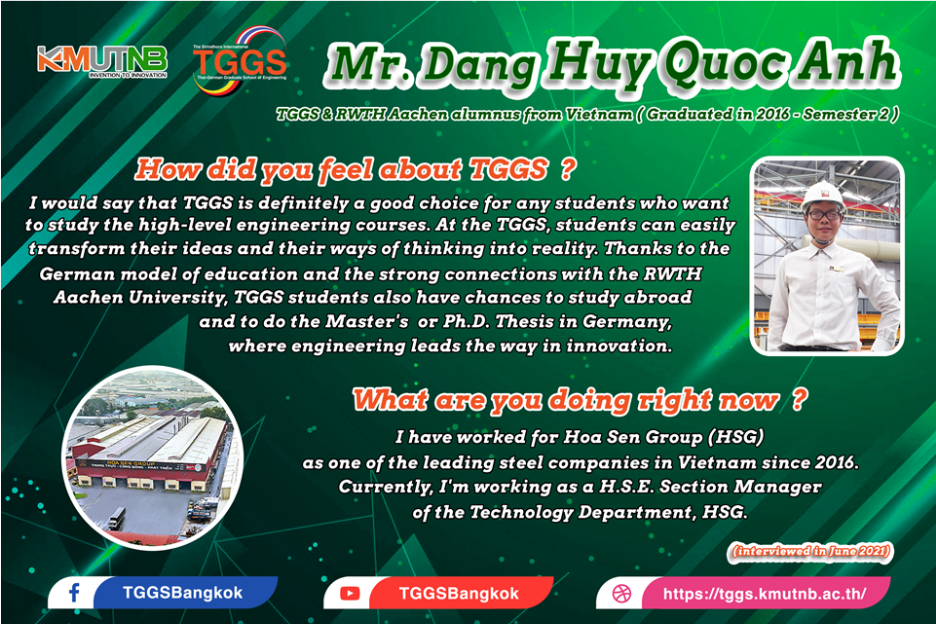Career & Alumni
Graduates with a Master of Engineering
(MEng)
in Chemical Engineering can pursue a variety of challenging and rewarding roles in multiple industries ranging from traditional manufacturing and petrochemicals to cutting-edge biotechnology and environmental sustainability. Their in-depth knowledge of chemical processes, materials science, and engineering principles makes them highly sought-after for positions that require both technical expertise and strong problem-solving skills. Below are some common career paths and opportunities

1. Process Engineer
- Role: Design, optimize, and troubleshoot chemical processes to ensure maximum efficiency, safety, and quality.
- Industries: Petrochemicals, pharmaceuticals, food and beverages, energy, and materials manufacturing.
- Typical responsibilities: Developing process flow diagrams, scaling up lab processes to production, and implementing cost-saving improvements.

2. Research and Development (R&D) Engineer
- Role: Conduct research to innovate new processes, materials, or technologies and improve existing ones.
- Industries: Biotechnology, specialty chemicals, consumer goods (e.g., personal care products, paints/coatings), and advanced materials.
- Typical responsibilities: Designing experiments, analyzing test results, collaborating with cross-functional teams (e.g., chemists, materials scientists, mechanical engineers).

3. Project Manager / Project Engineer
- Role: Plan and oversee engineering projects, ensuring objectives are met on time and within budget.
- Industries: Construction firms, EPC (Engineering, Procurement & Construction) companies, consulting organizations, and various manufacturing sectors.
- Typical responsibilities: Scheduling and resource allocation, risk management, stakeholder coordination, maintaining safety and compliance standards.

4. Quality Control / Quality Assurance Engineer
- Role: Develop and enforce quality standards and testing protocols to ensure products and processes meet regulatory and industry standards.
- Industries: Pharmaceuticals, food and beverage, medical devices, and chemical manufacturing.
- Typical responsibilities: Inspecting production sites, conducting audits, developing standard operating procedures (SOPs), and working with R&D and production teams to rectify non-compliance issues.

5. Environmental Engineer / Sustainability Specialist
- Role: Minimize the environmental impact of industrial processes and help organizations meet sustainability goals.
- Industries: Waste management, water treatment, renewable energy, government agencies, and NGOs.
- Typical responsibilities: Designing pollution control systems, monitoring emissions, advising on sustainable process design and resource management.

6. Consultant
- Role: Provide expert advice to improve operational efficiency, implement new technologies, and manage large-scale engineering projects.
- Industries: Consulting firms (engineering, environmental, and management), government organizations, and private-sector clients.
- Typical responsibilities: Analyzing complex engineering challenges, recommending strategic improvements, ensuring regulatory compliance, conducting risk assessments.

7. Technical Sales / Marketing Engineer
- Role: Utilize technical knowledge to assist in selling complex products or services and communicate their benefits to clients.
- Industries: Manufacturing and distribution of industrial equipment, chemical products, and related technologies.
- Typical responsibilities: Preparing proposals, conducting product demonstrations, providing technical support, gathering market insights, and developing sales strategies.

8. Academia / Further Research
- Role: Teach and conduct advanced research in universities or research institutions.
- Opportunities: PhD programs, post-doctoral research, or faculty positions.
- Typical responsibilities: Mentoring students, securing research funding, publishing scholarly papers, presenting findings at conferences.
Graduates with a Doctor of Engineering
(DEng)
Chemical Engineering opens up expansive opportunities for leadership and innovation—whether you choose a path in industry, academia, government, or entrepreneurship. By combining rigorous research skills with a practical, solutions-oriented approach, they play a critical role in advancing the chemical engineering field and addressing some of the world’s most pressing scientific and engineering challenges. Below are some of the major career opportunities and paths

1. Advanced Research 1. Development (R&D) Leadership
- Role: Lead teams in developing innovative processes, products, or technologies.
- Industries: Pharmaceuticals, petrochemicals, biotechnology, renewable energy, advanced materials.
- Typical responsibilities: Overseeing experimental design, supervising R&D staff, securing funding, collaborating with cross-functional teams, and managing intellectual property (e.g., patents).

2. Executive / Senior Engineering Management
- Role: Oversee engineering functions at high levels, helping shape an organization’s technical strategy and policies.
- Industries: Large manufacturing organizations, multinational corporations, and technology startups.
- Typical responsibilities: Strategic decision-making (e.g., investments in emerging technologies), guiding process optimization, ensuring compliance and sustainability goals, and coordinating multiple engineering teams.

3. Industrial Consultant or Technical Advisor
- Role: Provide in-depth technical expertise, advise on large-scale projects, and solve highly specialized or complex problems.
- Industries: Consulting firms serving chemical, pharmaceutical, and energy sectors; government agencies; NGOs.
- Typical responsibilities: Conducting root-cause analyses, developing novel process solutions, advising on regulatory or safety compliance, introducing best practices for emerging technologies.

4. Academia and Research Institutions
- Role: Conduct cutting-edge research, publish scholarly articles, mentor graduate students, and teach advanced chemical engineering courses.
- Opportunities: University faculty positions (professor, lecturer, or research scientist), research group leader in public or private institutes.
- Typical responsibilities: Securing grants, establishing research collaborations, organizing conferences, and shaping curriculum development.

5. Government and Regulatory Agencies
- Role: Serve as a subject-matter expert in policy-making, regulation, and public-sector research programs.
- Agencies: Environmental Protection Agency (EPA), Department of Energy (DOE), Food and Drug Administration (FDA), and equivalent international bodies.
- Typical responsibilities: Evaluating emerging technologies, drafting guidelines for industrial emissions or waste management, reviewing new processes or materials for safety and compliance.

6. Entrepreneurship and Startups
- Role: Leverage specialized research expertise to launch or join startups in technology-driven fields (e.g., biotech, clean energy, advanced materials).
- Typical responsibilities: Raising venture capital, leading product development, building R&D teams, and forging strategic partnerships with larger corporations.
Alumni
1.Graduate with Master Degree (International Student)

